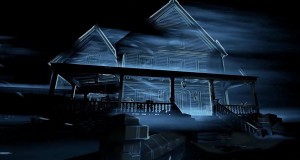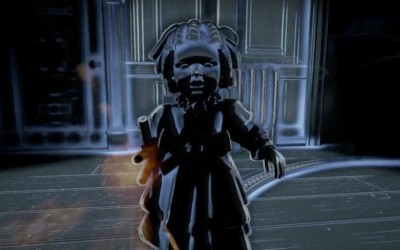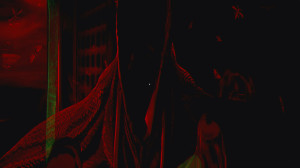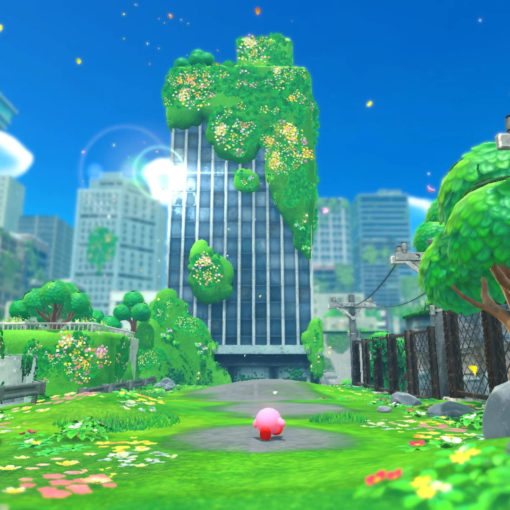Perception (2017) by The Deep End Games is above all else a psychological horror game about connection. And the game itself begins with one woman’s search for connection. Cassie, the protagonist, is a blind woman who has been drawn to a house by dreams about the house, a rope, a ticket, and apple, and an axe. Using only echolocation Cassie must solve the puzzles that the house holds in order to discover secrets about her own past and to figure out what her connection to it is.
Over the course of four chapters of gameplay Perception tells the stories (told by writer Amanda Gardner who talked to us about the game on a past podcast) of the past residents of the house from four different time periods who are connected to and influenced by The Presence (a spirit that belongs to/is the house). In this way, the game’s depiction of connection is also tied to the idea of memory–ancestral memory, historical memory, traumatic memory–and it is not just the house itself (and the ghosts who live there) that represents such memory but Cassie, too, seems to embody all of this as well in the ways she is connected to (and searches through, as she works her way through the many rooms and hallways) the house’s various pasts.
 The house itself–a sprawling, abandoned (or is it?) mansion in Gloucester, Massachusetts–is a familiar enough setting for a game entrenched in the horror genre, as are the game’s narrative explorations of the themes of motherhood, gendered labor, and domesticity. As such, Perception brings to mind conversations we’ve had here before about other games.
The house itself–a sprawling, abandoned (or is it?) mansion in Gloucester, Massachusetts–is a familiar enough setting for a game entrenched in the horror genre, as are the game’s narrative explorations of the themes of motherhood, gendered labor, and domesticity. As such, Perception brings to mind conversations we’ve had here before about other games.
Its interrogation of madness and motherhood through the ghostly memory of Felicia Briar, and the fact that Cassie must walk through the house to find Felicia’s story, is reminiscent of Among the Sleep both in story and structure. However, while Among the Sleep renders this intersection of madness and motherhood as one that is monstrous—while Among the Sleep vilifies its monstrous mother—Perception seems to take a more nuanced, humanizing, empathetic approach in its examination of mothering, an approach that seems to reject the idea of mother-blaming and shaming.
 Through the spiritual remnants of the mansion’s other inhabitants we see clearly how the patriarchy affects the notion of what it is to behave appropriately for those coded as male and female alike and we witness what they must endure for their recalcitrance. Through the stories of Betty and Gene, Dr. Bosch, and Susannah Mortin (who is based upon an actual ancestor of developer Bill Gardner) we see sadly beautiful traces of actual history, games like those in the Bioshock series (unsurprisingly since Bill is a veteran of the series) and literature like Kate Chopin’s The Awakening, Thomas Hardy’s Tess of D’Ubervilles, and Arthur Miller’s The Crucible.
Through the spiritual remnants of the mansion’s other inhabitants we see clearly how the patriarchy affects the notion of what it is to behave appropriately for those coded as male and female alike and we witness what they must endure for their recalcitrance. Through the stories of Betty and Gene, Dr. Bosch, and Susannah Mortin (who is based upon an actual ancestor of developer Bill Gardner) we see sadly beautiful traces of actual history, games like those in the Bioshock series (unsurprisingly since Bill is a veteran of the series) and literature like Kate Chopin’s The Awakening, Thomas Hardy’s Tess of D’Ubervilles, and Arthur Miller’s The Crucible.
This seems to be because of the roles the house and The Presence both play (and the ways these roles are often intertwined, blurred, and linked) in leading people to madness. And because The Presence is the game’s antagonist, the ghosts are not; they are not depicted as malevolent, vengeful spirits but as beings who want to tell their stories, to have someone witness their memories and understand their experiences so that they can find their paths to peace. In this way, The Presence’s antagonism is constructed as a silencing force, one that seeks to silence these stories by working to find and kill Cassie (and thus prevent her from learning what happened to the house’s former inhabitants). This silencing also seems to be connected to the fact that The Presence appears if Cassie makes too much noise walking through the house and echolocating to search her surroundings.
 The Presence is aggravated by more than the racket caused by the inhabitants (spiritual and corporeal) of the manor, it is angered by their refusal to conform as well. The Presence is the spiritual manifestation of The Patriarchy and Perception shows us what happens to those who do not assume the mantle of the cult of domesticity. This includes women who find themselves on the wrong side of what it is to be considered feminine and men who find themselves going against stereotypically masculine roles. Women must be nurturers, men must not. Exploring the narratives of the past inhabitants of the mansion (and by extension their gender roles) not only leads to moments of terrifying anticipation and deep sadness, but also to moments of clarity and introspection leaving us to we consider what the cult of domesticity means for men and women alike. It is in those moments that we realize the The Presence and, by extension, The Patriarchy are dangerous to all humans regardless of gender or sex. When humans in general are forced to adhere to a strict set of antiquated rules and mores it will always be to someone’s detriment. So the name The Presence itself is telling–because it, ultimately, like The Patriarchy itself, is and always has been both violently dangerous and ever present.
The Presence is aggravated by more than the racket caused by the inhabitants (spiritual and corporeal) of the manor, it is angered by their refusal to conform as well. The Presence is the spiritual manifestation of The Patriarchy and Perception shows us what happens to those who do not assume the mantle of the cult of domesticity. This includes women who find themselves on the wrong side of what it is to be considered feminine and men who find themselves going against stereotypically masculine roles. Women must be nurturers, men must not. Exploring the narratives of the past inhabitants of the mansion (and by extension their gender roles) not only leads to moments of terrifying anticipation and deep sadness, but also to moments of clarity and introspection leaving us to we consider what the cult of domesticity means for men and women alike. It is in those moments that we realize the The Presence and, by extension, The Patriarchy are dangerous to all humans regardless of gender or sex. When humans in general are forced to adhere to a strict set of antiquated rules and mores it will always be to someone’s detriment. So the name The Presence itself is telling–because it, ultimately, like The Patriarchy itself, is and always has been both violently dangerous and ever present.




